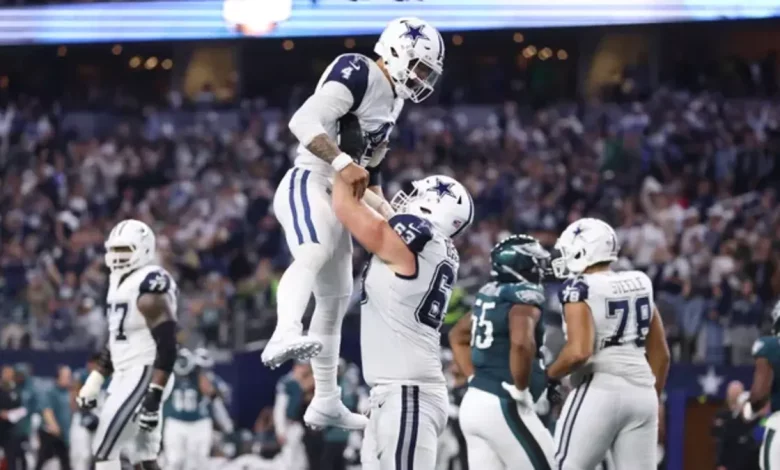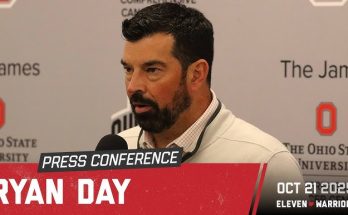In the aftermath of the Philadelphia Eagles’ recent Super Bowl victory, Dallas Cowboys quarterback Dak Prescott made a bold assertion: “It’s our turn.” This statement has ignited a flurry of discussions among fans, analysts, and former players, raising questions about the Cowboys’ current standing and their prospects for ending a nearly three-decade-long championship drought.
Prescott’s Confidence Amidst Adversity
Prescott’s declaration reflects a steadfast belief in his team’s potential. He acknowledged the Eagles’ achievement but emphasized the Cowboys’ competitive edge in head-to-head matchups. “I feel like we’ve competed with the Eagles and beat them for the most part when we’ve played them,” Prescott remarked. “I don’t want to say, ‘Check the record,’ when the other guy is holding the trophy, right? So credit to them. They’ve earned it, and they deserve it by all means. But … [we’re] very close.”
Historically, Prescott has a favorable regular-season record against the Eagles, boasting a 9-4 advantage. However, his postseason performances have been less impressive, with a 2-5 playoff record and no appearances beyond the divisional round. This contrast underscores the gap between regular-season success and playoff triumphs, a chasm the Cowboys have struggled to bridge in recent years.
A Legacy of Unfulfilled Expectations
The Cowboys’ last Super Bowl appearance and victory occurred during the 1995-96 … under the leadership of quarterback Troy Aikman. Since then, the franchise has not advanced to a conference championship game, a point of contention and frustration among fans and former players alike. Aikman himself has expressed discontent with the prolonged championship drought, highlighting the high expectations that accompany the Cowboys’ storied history.
The team’s recent performance has done little to alleviate these concerns. The 2024 season was particularly challenging, with the Cowboys finishing with a 7-10 record. Prescott’s season was cut short due to a right hamstring injury after just eight games, during which he recorded 11 touchdown passes against eight interceptions. These struggles have amplified scrutiny of both Prescott’s leadership and the organization’s direction.
Leadership Changes and Future Prospects
In response to these challenges, the Cowboys have initiated significant leadership changes. The departure of head coach Mike McCarthy paved the way for Brian Schottenheimer, who previously served as the team’s offensive coordinator, to take the helm. Prescott has expressed enthusiasm about this transition, stating, “Super excited for him. Obviously, I’ve worked with him the … .”
Schottenheimer’s promotion is seen as a move towards revitalizing the team’s strategy and performance. His familiarity with the organization’s culture and players could facilitate a smoother transition and potentially address some of the issues that have plagued the team in recent seasons.
Criticism and Skepticism
Despite the internal optimism, Prescott’s comments have not been universally well-received. Analyst Skip Bayless labeled Prescott’s remarks as “delusional,” criticizing the quarterback’s confidence given the team’s recent underperformance. Bayless highlighted Prescott’s playoff record and compared it unfavorably to that of Eagles quarterback Jalen Hurts, emphasizing the need for tangible results over rhetoric.
This skepticism is shared by segments of the fan base, who have grown weary of unfulfilled promises and unmet expectations. The juxtaposition of Prescott’s optimism against the backdrop of the team’s prolonged struggles has led to a call for a more measured approach, focusing on performance improvements rather than proclamations.
The Weight of Expectations
The Cowboys’ brand carries significant weight in the NFL, with a rich history and a passionate fan base. This legacy brings with it substantial expectations, and the team’s inability to reach the Super Bowl in nearly 30 years has been a source of considerable frustration. Prescott’s recent contract, making him the highest-paid player in the NFL, further intensifies the pressure to deliver results.
Owner Jerry Jones has been vocal about his desire for immediate success, stating, “I wouldn’t have signed Dak Prescott, highest-paid player in the NFL, if now wasn’t when we wanted to win. This is a shocker to be here at this Super Bowl and not have the Cowboys [playing in it].”
Looking Ahead
As the Cowboys prepare for the upcoming season, the organization faces a critical juncture. The combination of leadership changes, player development, and strategic adjustments will play pivotal roles in determining the team’s trajectory. Prescott’s recovery from injury and his performance under Schottenheimer’s guidance will be closely monitored as indicators of the team’s potential resurgence.
The road to reclaiming championship glory is fraught with challenges, and the Cowboys must navigate internal and external pressures to achieve their goals. While Prescott’s assertion that “it’s our turn” reflects a desire to break free from the shadows of past disappointments, the team must translate this sentiment into on-field success to truly silence the doubters and fulfill their championship aspirations.
In conclusion, Dak Prescott’s bold claim has sparked a necessary conversation about the Dallas Cowboys’ current state and future prospects. The blend of optimism and skepticism surrounding his remarks underscores the complex dynamics at play within the organization and its fan base. As the new season approaches, the Cowboys have an opportunity to redefine their narrative and strive towards ending their long-standing Super Bowl drought.
The Path to Proving Themselves: What the Cowboys Must Do Next
While Dak Prescott’s confidence in his team is commendable, words alone won’t bring the Cowboys a Lombardi Trophy. Several key areas need urgent attention if Dallas is to back up its quarterback’s claim that “it’s our turn.”
1. Strengthening the Roster in Key Areas
One of the biggest challenges facing the Cowboys is ensuring they have the right personnel to make a deep playoff run. While their regular season performances have been strong in recent years, they have fallen short in crucial moments due to deficiencies in both roster depth and high-pressure execution.
-
Offensive Line Concerns
A staple of the Cowboys’ dominance in the 1990s and even in Prescott’s early years was a strong offensive line. However, injuries and inconsistent play have made this a weaker unit in recent seasons. If Prescott is to lead Dallas to the promised land, the front office must prioritize reinforcing the O-line in free agency or the draft. -
Defensive Consistency
While the Cowboys’ defense, led by superstar pass rusher Micah Parsons, has been one of the best in the league, they have had games where they struggled to stop elite offenses. The playoff loss to the Green Bay Packers in the Wild Card round exposed some of these issues, especially in the secondary. Dallas needs to shore up its defensive backfield to ensure it can keep up with high-powered offenses like those of the Eagles, 49ers, and Chiefs. -
Finding a Reliable Running Game
The departure of Ezekiel Elliott and the reliance on Tony Pollard has left the Cowboys’ running game inconsistent. While Pollard has been explosive, he hasn’t been the dominant every-down back the team needs. Finding a complementary power back would help balance the offense and take some pressure off Prescott.
2. Overcoming Playoff Struggles
The most glaring issue for the Cowboys has been their inability to perform in the postseason. Prescott’s playoff record of 2-5 is a major point of criticism, especially when compared to NFC rivals like Jalen Hurts (Eagles) and Brock Purdy (49ers), who have led their teams to NFC Championship games and Super Bowls.
One of the main problems has been game management in high-pressure situations. Against the 49ers in the 2022 and 2023 playoffs, Dallas struggled with clock management and offensive execution in critical moments. The infamous failed final play against the 49ers in the 2022 playoffs, where Ezekiel Elliott was lined up as the center before a disastrous lateral attempt, became a meme that encapsulated the team’s struggles.
To turn things around, the Cowboys must ensure that:
- Prescott and the offense can remain composed in crucial moments.
- The coaching staff makes smarter in-game decisions.
- The defense steps up against elite quarterbacks, something they failed to do against Aaron Rodgers and the Packers in the 2024 playoffs.
3. Coaching Stability Under Brian Schottenheimer
The hiring of Brian Schottenheimer as head coach signals a shift in leadership, but it remains to be seen whether he can elevate this team to a championship level. His history as an offensive coordinator has been mixed—he helped improve Russell Wilson’s efficiency in Seattle, but he also faced criticism for conservative play-calling.
A big question mark remains: Can Schottenheimer maximize Prescott’s strengths while limiting his weaknesses?
Prescott has shown he can play at an MVP-caliber level in the regular season, but he needs to prove he can sustain that in the playoffs. Schottenheimer’s ability to design an offense that takes advantage of Prescott’s skills—while minimizing costly turnovers—will be critical.
4. Handling External Pressure and Media Scrutiny
The Dallas Cowboys are the most scrutinized franchise in the NFL, and the pressure on them to win is immense. Every year, the team enters the season with high expectations, only for those hopes to be dashed in the playoffs.
With Prescott’s “it’s our turn” statement, he has now placed even more attention on the Cowboys’ 2025 season. If they struggle early, the media will quickly question his leadership and whether he can be the quarterback to take Dallas to the next level.
5. The Dak Prescott Legacy: Will He Be Remembered as the Quarterback Who Broke the Curse?
For Prescott, the upcoming season is pivotal for his legacy. He is already the highest-paid player in the league, and with that comes enormous expectations. While he has been a solid quarterback, he has yet to reach the level of elite QBs who have carried their teams to championships.
Quarterbacks in the NFC like Jalen Hurts, Brock Purdy, and even Jared Goff have all made deeper playoff runs than Prescott. If the Cowboys fail to reach the NFC Championship Game again, it will lead to difficult conversations about whether Prescott is the right quarterback to lead them into the future.
Jerry Jones has remained publicly supportive of Prescott, but the Cowboys owner is known for his impatience. If another disappointing playoff exit occurs, discussions about finding a new quarterback—either through the draft or free agency—could intensify.
Final Thoughts: Is It Really “Their Turn”?
While Prescott’s claim that “it’s our turn” is a bold one, the Cowboys must prove it on the field. The talent is there—players like Micah Parsons, CeeDee Lamb, and Trevon Diggs give them the foundation of a championship-caliber team. However, execution, coaching decisions, and mental toughness in high-pressure situations have held them back.
For Cowboys fans, the hope is that 2025 will be the year they finally break their Super Bowl drought. However, until they can consistently win in the postseason, Prescott’s statement will remain just words.
Now, it’s up to the Cowboys to turn those words into reality.



